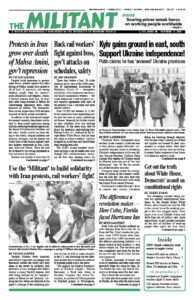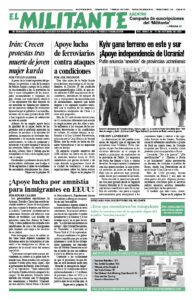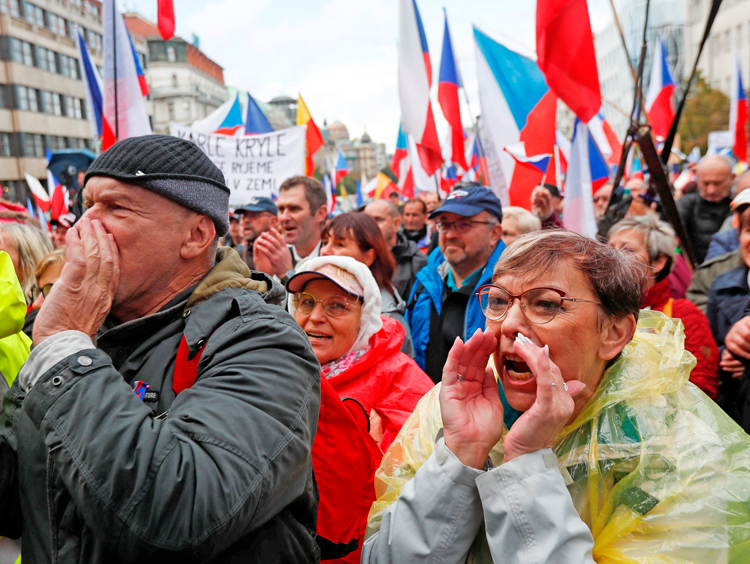Rising prices are wreaking havoc with the lives of working people and our families worldwide. Inflation reduces the value of our wages as we confront higher costs for food, fuel, housing and other essentials, and rising debts.
Now we confront an expanding slowdown in capitalist investment, production and trade, increasing prospects that workers and farmers will confront an extended period of stagflation — where inflation eats into our living standards at the same time bosses cut back amid tightening markets, and competition among workers for jobs sharpens.
Despite this, the big-business media claim the economy is doing just fine, pointing to an unemployment rate of only 3.7%. They contend many new jobs are being created. But this masks the situation working people face.
A large number of newly created jobs are at low pay, forcing an increasing number of workers to take on a second or even a third job to make ends meet. At the same time, bosses are hiring part-time workers with few if any benefits, and pushing speedup, as part of their drive to defend their profits and to weaken our unions.
In August those working full time actually dropped by 242,000, the third monthly decline in a row. Soaring prices for food, energy and housing hit working people especially hard.
Sizable protests against these assaults have been held in many countries. In France thousands joined protests in dozens of cities Sept. 29 during a one-day walkout called by the CGT union federation. They denounced rising food prices and moves by French President Emmanuel Macron to raise the retirement age from 62 to 64 or 65. “Increase our salaries, not the age of retirement,” Metro conductor Ludovic Le Ny, told the Wall Street Journal in Paris.
The day before in the Czech Republic thousands protested in Prague. “I can’t provide my daughter with the things I had as a kid,” Claudia Trantina told the New York Times. “I can’t do things like take her to the zoo or restaurants.”
In the U.S. workers have not seen a rise in real wages since the 1970s, making it increasingly difficult for young workers to move out of their parents’ homes and have a family.
The increase in interest rates Sept. 21 by the Federal Reserve raised what workers owe on credit card debt, mortgages and car loans. Average home mortgage rates rose to 6.7% , the highest rate in over 15 years.
The depth of the social crisis is reflected in the fact that opioid overdoses remain at record levels; suicides are on the rise, particularly among males ages 15 to 24; the birthrate has fallen to its lowest level since 1979; and life expectancy has declined to 76 years, its lowest level in more than 25 years.
Rising prices worldwide
Inflation in the 19 European Union countries that use the euro as a common currency hit a new high at 10% in September, the 11th consecutive monthly rise. The crisis is deepened by Moscow’s invasion of Ukraine and its impact on gas supplies. Energy prices rose 40.8% across the eurozone, where workers in half the countries face double-digit inflation. In three Baltic states prices jumped over 20%.
In September inflation in Germany, Europe’s strongest economic power, hit a 71-year high of 10.9%, while production declined. The European Central Bank is considering raising interest rates again in October. Three months earlier it did so for the first time since 2011.
Protests have been organized across Asia, Latin America and Africa, where working people have been hit hardest by out-of-control price rises. Rail and port workers in South Africa, members of the United National Transport Union at Transnet, will strike Oct. 6 after rejecting a paltry 1.5% pay raise. Prices, especially for housing and health care, the union points out, are soaring.
For decades China has been a haven for investment and profits for imperialist powers and its own capitalists. Today it is increasingly affected by the worldwide crisis. The World Bank has slashed its economic outlook for the Asia-Pacific region, and is projecting the Chinese economy to grow by just 2.8% this year. Meanwhile, China’s currency, the renminbi, fell to its lowest level since 2008 against the dollar, which has been strengthened in relation to other currencies by the Federal Reserve’s decision to raise interest rates.
The social and economic crisis in China increases prospects for struggles by workers and farmers. Protests swept Shanghai in April against a brutal government lockdown, and Zhengzhou in July by residents angry at banks that froze access to millions of dollars of their lifesavings.


